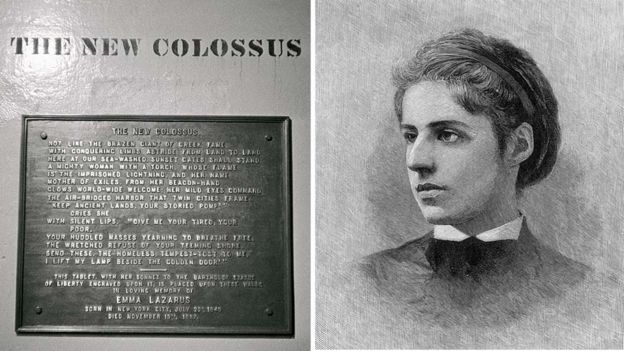
This article is more than
6 year old
The head of Citizenship and Immigration Services tweaked the passage: "Give me your tired, your poor, your huddled masses yearning to breathe free".
The official added the words "who can stand on their own two feet and who will not become a public charge".
It comes as Trump officials debuted a regulation that denies aid to migrants.
Ken Cuccinelli, the Trump administration's acting head of Citizenship and Immigration Services, announced on Monday a new "public charge" requirement that limits legal migrants from seeking certain public benefits such as public housing or food aid, or are considered likely to do so in the future.

The new regulation, known as a "public charge rule", was published in the Federal Register on Monday and will take effect on 15 October.
The rule change is intended to reinforce "ideals of self-sufficiency", officials said. Critics argue that it will prevent low-income US residents from seeking help.
On Tuesday, Mr Cuccinelli was asked by NPR whether the 1883 poem titled The New Colossus at the Statue of Liberty on New York's Ellis Island still applied.
"Would you also agree that Emma Lazarus's words etched on the Statue of Liberty, 'Give me your tired, give me your poor,' are also a part of the American ethos?" asked NPR's Rachel Martin.

"They certainly are," Mr Cuccinelli responded. "Give me your tired and your poor - who can stand on their own two feet and who will not become a public charge."
"That plaque was put on the Statue of Liberty at almost the same time as the first public charge [law] was passed - very interesting timing," he added.
The actual passage reads in part: "Give me your tired, your poor, Your huddled masses yearning to breathe free, The wretched refuse of your teeming shore. Send these, the homeless, tempest-tost to me, I lift my lamp beside the golden door!"
In the interview, he added that immigrants are welcome "who can stand on their own two feet, be self-sufficient, pull themselves up by their bootstraps, again, as in the American tradition".
Read More (...)